Items
Tag is exactly
social life
-
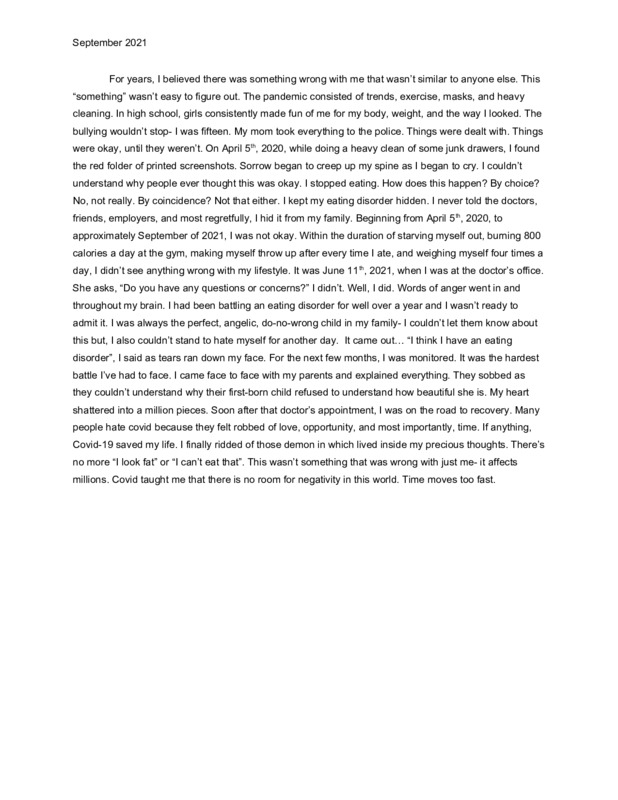 2021-09-13
2021-09-13Mental Health in the Eyes of a Pandemic
For years, I believed there was something wrong with me that wasn’t similar to anyone else. This “something” wasn’t easy to figure out. The pandemic consisted of trends, exercise, masks, and heavy cleaning. In high school, girls consistently made fun of me for my body, weight, and the way I looked. The bullying wouldn’t stop- I was fifteen. My mom took everything to the police. Things were dealt with. Things were okay, until they weren’t. On April 5th, 2020, while doing a heavy clean of some junk drawers, I found the red folder of printed screenshots. Sorrow began to creep up my spine as I began to cry. I couldn’t understand why people ever thought this was okay. I stopped eating. How does this happen? By choice? No, not really. By coincidence? Not that either. I kept my eating disorder hidden. I never told the doctors, friends, employers, and most regretfully, I hid it from my family. Beginning from April 5th, 2020, to approximately September of 2021, I was not okay. Within the duration of starving myself out, burning 800 calories a day at the gym, making myself throw up after every time I ate, and weighing myself four times a day, I didn’t see anything wrong with my lifestyle. It was June 11th, 2021, when I was at the doctor’s office. She asks, “Do you have any questions or concerns?” I didn’t. Well, I did. Words of anger went in and throughout my brain. I had been battling an eating disorder for well over a year and I wasn’t ready to admit it. I was always the perfect, angelic, do-no-wrong child in my family- I couldn’t let them know about this but, I also couldn’t stand to hate myself for another day. It came out… “I think I have an eating disorder”, I said as tears ran down my face. For the next few months, I was monitored. It was the hardest battle I’ve had to face. I came face to face with my parents and explained everything. They sobbed as they couldn’t understand why their first-born child refused to understand how beautiful she is. My heart shattered into a million pieces. Soon after that doctor’s appointment, I was on the road to recovery. Many people hate covid because they felt robbed of love, opportunity, and most importantly, time. If anything, Covid-19 saved my life. I finally ridded of those demon in which lived inside my precious thoughts. There’s no more “I look fat” or “I can’t eat that”. This wasn’t something that was wrong with just me- it affects millions. Covid taught me that there is no room for negativity in this world. Time moves too fast. The presence of eating disorders during the pandemic can help historians understand the impact of cyberbullying, food scarcity due to supply chain issues, etc. I don’t believe that researchers realize how many adults and children were affected by mental illness due to persistent lockdowns, isolation periods, restricted visitation, and new introductions to a virtual society. My experience offers intel to how mental and physical illnesses were underestimated throughout the entirety of the pandemic. Whether it be an eating disorder or a cancer patient, it’s difficult to watch because it seems like covid-19 patients are prioritized everywhere even if they choose not to be vaccinated. It’s a hard thing to watch in terms of priority because cancer patients, heart disease patients, etc. have less room in hospitals because people choose to not be vaccinated. With that being said, being vaccinated has no 100% guarantee of not being hospitalized but it lowers the rates substantially. -
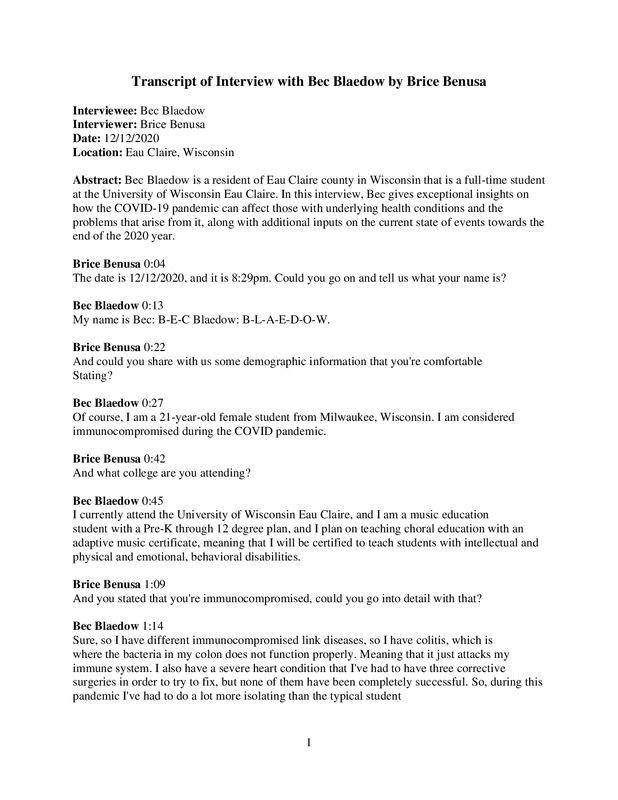 12/17/2020
12/17/2020Bec Blaedow Oral History, 2020/12/07
Bec Blaedow is a resident of Eau Claire county in Wisconsin that is a full-time student at the University of Wisconsin Eau Claire. In this interview, Bec gives exceptional insights on how the COVID-19 pandemic can affect those with underlying health conditions and the problems that arise from it, along with additional inputs on the current state of events towards the end of the 2020 year. -
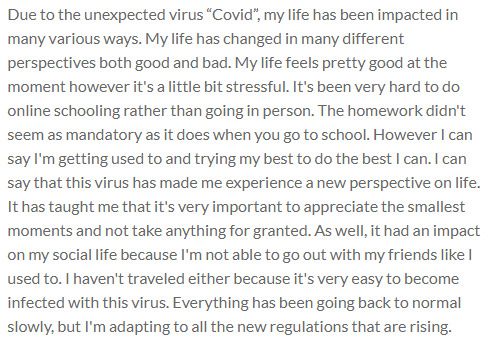 2021-12-20
2021-12-20How Covid Affected me
Due to the unexpected virus “Covid”, my life has been impacted in many various ways. My life has changed in many different perspectives both good and bad. My life feels pretty good at the moment however it's a little bit stressful. It's been very hard to do online schooling rather than going in person. The homework didn't seem as mandatory as it does when you go to school. However I can say I'm getting used to and trying my best to do the best I can. I can say that this virus has made me experience a new perspective on life. It has taught me that it's very important to appreciate the smallest moments and not take anything for granted. As well, it had an impact on my social life because I'm not able to go out with my friends like I used to. I haven't traveled either because it's very easy to become infected with this virus. Everything has been going back to normal slowly, but I'm adapting to all the new regulations that are rising. -
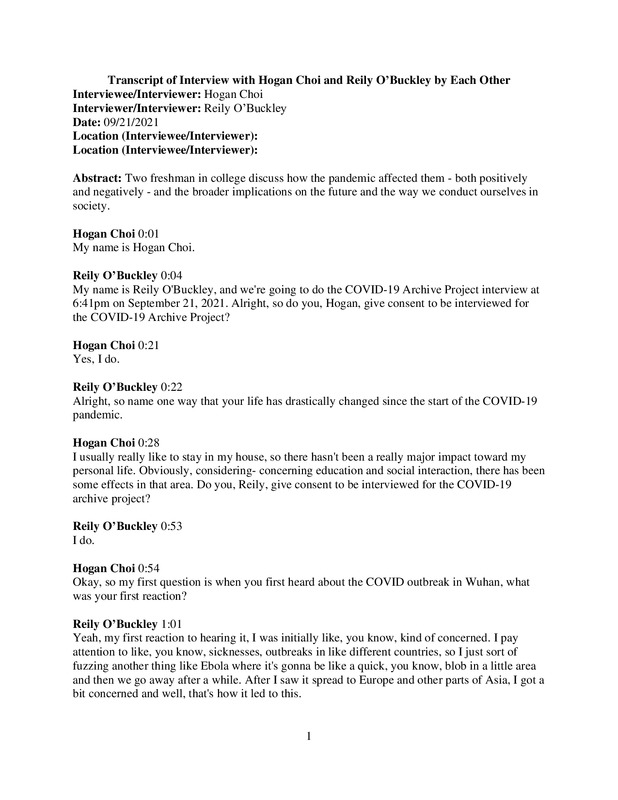 2021-09-21
2021-09-21Hogan Choi and Reily O'Buckley Oral History, 2021/09/21
This is an interview between two Northeastern University students on how Covid-19 that shared their thoughts about the impact of Covid 19 both personally and globally. -
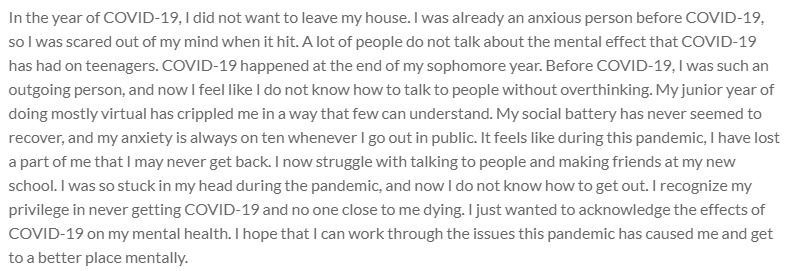 2021-07-06
2021-07-06The Year the World Turned Upside Down
In the year of COVID-19, I did not want to leave my house. I was already an anxious person before COVID-19, so I was scared out of my mind when it hit. A lot of people do not talk about the mental effect that COVID-19 has had on teenagers. COVID-19 happened at the end of my sophomore year. Before COVID-19, I was such an outgoing person, and now I feel like I do not know how to talk to people without overthinking. My junior year of doing mostly virtual has crippled me in a way that few can understand. My social battery has never seemed to recover, and my anxiety is always on ten whenever I go out in public. It feels like during this pandemic, I have lost a part of me that I may never get back. I now struggle with talking to people and making friends at my new school. I was so stuck in my head during the pandemic, and now I do not know how to get out. I recognize my privilege in never getting COVID-19 and no one close to me dying. I just wanted to acknowledge the effects of COVID-19 on my mental health. I hope that I can work through the issues this pandemic has caused me and get to a better place mentally. -
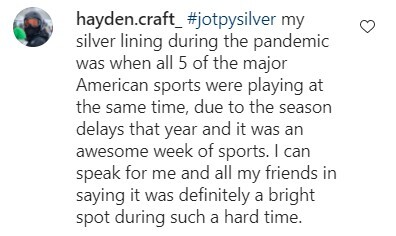 2021-03-09
2021-03-09#JOTPYSilver from hayden.craft_
#jotpysilver my silver lining during the pandemic was when all 5 of the major American sports were playing at the same time, due to the season delays that year and it was an awesome week of sports. I can speak for me and all my friends in saying it was definitely a bright spot during such a hard time. -
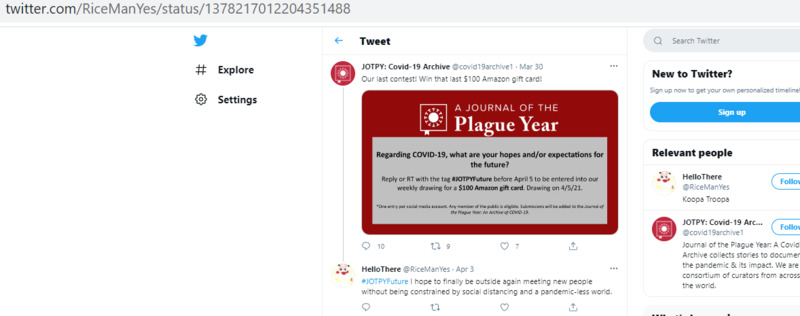 2021-04-03
2021-04-03JOTPYFuture submission from HelloThere
#JOTPYFuture I hope to finally be outside again meeting new people without being constrained by social distancing and a pandemic-less world. -
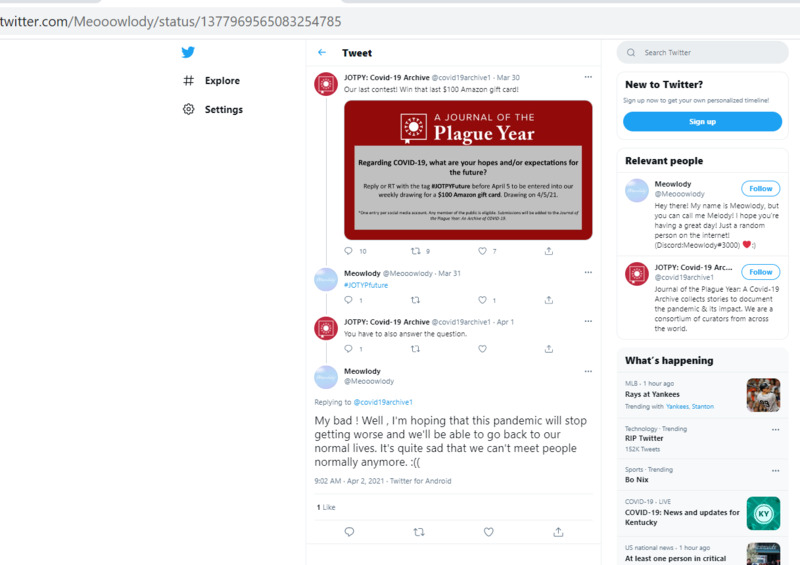 2021-04-02
2021-04-02#JOTPYFuture entry from Meowlody
My bad ! Well , I'm hoping that this pandemic will stop getting worse and we'll be able to go back to our normal lives. It's quite sad that we can't meet people normally anymore. :(( -
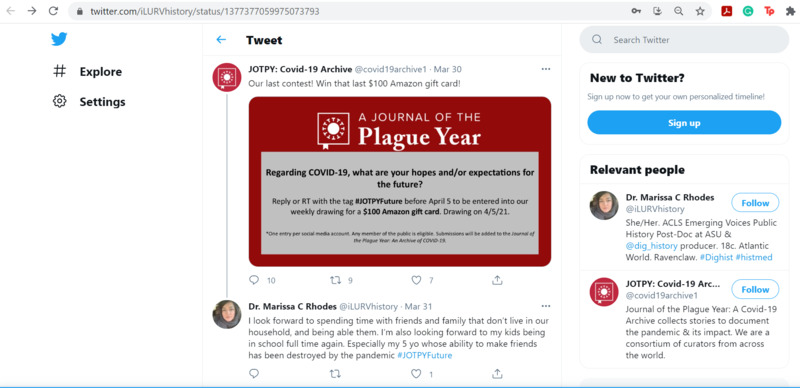 2021-03-31
2021-03-31#JOTPYFuture from Marissa Rhodes
I look forward to spending time with friends and family that don’t live in our household, and being able them. I’m also looking forward to my kids being in school full time again. Especially my 5 yo whose ability to make friends has been destroyed by the pandemic #JOTPYFuture -
2021-01-25
Covid-19 Statistics and Final Thoughts
Well, Covid-19 has effected us ALL and as a country too. In the U.S, 25.2 million people have tested positive for Covid-19. Also, unfortunately 420 thousand Americans have died. In the world, many people have tested positive for Covid-19 and also have died form this foreign virus. The exact number of the cases and deaths in the world from Covid-19 is extremely high and very discouraging. My History teacher actually tested positive for Covid-19 not too long ago, and at first, I was shocked. My school told me that I had to stay home and quarantine for 14 days. I was scared that someone so close to me contracted Covid-19. I was scared for my family, my friends, and myself. I am very glad the my history teacher and his family have fully recovered. Covid-19 has made 2020 and 2021 very rough. I has been very difficult learning online and having no social life. I am saddened by how many cases and deaths have appeared over 2020 and 2021. Living through this pandemic and learning online was very frustrating and annoying. I just pray for all those families who lost their loved ones. Overall, 2020 and 2021 has been a roller coaster ride for me. I just wish the best for everyone else. -
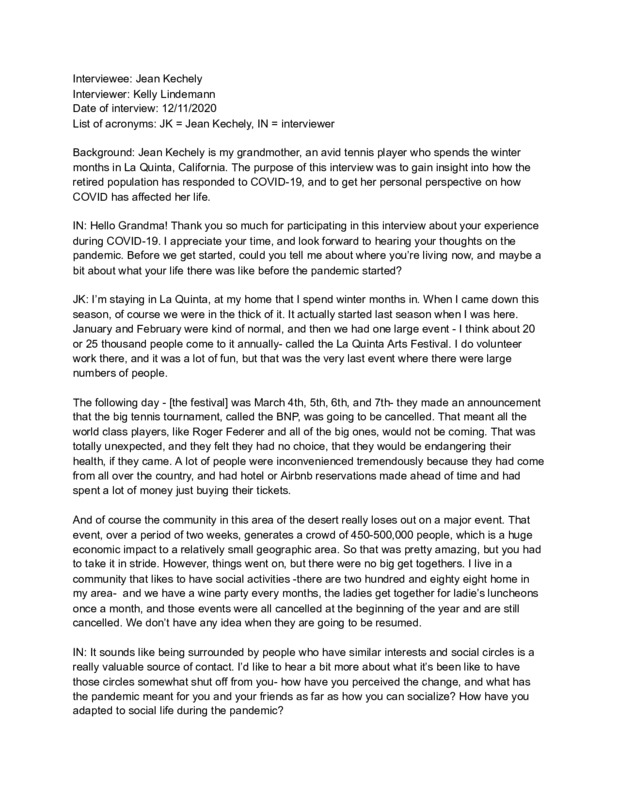 2020-12-11
2020-12-11Interview with Jean Kechely
Interviewee: Jean Kechely Interviewer: Kelly Lindemann Date of interview: 12/11/2020 List of acronyms: JK = Jean Kechely, IN = interviewer Background: Jean Kechely is my grandmother, an avid tennis player who spends the winter months in La Quinta, California. The purpose of this interview was to gain insight into how the retired population has responded to COVID-19, and to get her personal perspective on how COVID has affected her life. IN: Hello Grandma! Thank you so much for participating in this interview about your experience during COVID-19. I appreciate your time, and look forward to hearing your thoughts on the pandemic. Before we get started, could you tell me about where you’re living now, and maybe a bit about what your life there was like before the pandemic started? JK: I’m staying in La Quinta, at my home that I spend winter months in. When I came down this season, of course we were in the thick of it. It actually started last season when I was here. January and February were kind of normal, and then we had one large event - I think about 20 or 25 thousand people come to it annually- called the La Quinta Arts Festival. I do volunteer work there, and it was a lot of fun, but that was the very last event where there were large numbers of people. The following day - [the festival] was March 4th, 5th, 6th, and 7th- they made an announcement that the big tennis tournament, called the BNP, was going to be cancelled. That meant all the world class players, like Roger Federer and all of the big ones, would not be coming. That was totally unexpected, and they felt they had no choice, that they would be endangering their health, if they came. A lot of people were inconvenienced tremendously because they had come from all over the country, and had hotel or Airbnb reservations made ahead of time and had spent a lot of money just buying their tickets. And of course the community in this area of the desert really loses out on a major event. That event, over a period of two weeks, generates a crowd of 450-500,000 people, which is a huge economic impact to a relatively small geographic area. So that was pretty amazing, but you had to take it in stride. However, things went on, but there were no big get togethers. I live in a community that likes to have social activities -there are two hundred and eighty eight home in my area- and we have a wine party every months, the ladies get together for ladie’s luncheons once a month, and those events were all cancelled at the beginning of the year and are still cancelled. We don’t have any idea when they are going to be resumed. IN: It sounds like being surrounded by people who have similar interests and social circles is a really valuable source of contact. I’d like to hear a bit more about what it’s been like to have those circles somewhat shut off from you- how have you perceived the change, and what has the pandemic meant for you and your friends as far as how you can socialize? How have you adapted to social life during the pandemic? JK: Well actually, I would have to tell you that I feel very minimally impacted due to being a retired person and in excellent help, which enables me to engage in the normal activities that I enjoy, which I would describe as healthful recreation. I still play tennis three times a week, and my tennis club had to make a couple of changes. They require all of us members to wear a mask when we enter the property, but once we’re on the court and actually playing then we can remove our masks. Another big change was that we could not invite any guests to the club; that was something that we all enjoyed doing, but they felt that they couldn’t allow that. So, that’s how it still is right now. IN: As far as your companions in the club, are you all fairly like minded in your reactions, or are there differences in people’s opinion on how to respond to the virus? JK: Oh, there are many, many differences. Some people feel that they just don’t know what to believe about it. They don’t know what advice to follow, so anything that is actually mandated by the government, then we have to follow that to be good citizens. Several of the women with whom I play would have an adult child tell them “Well Mom, I don’t think you should be playing any longer because you have no control over where those people are going, or with whom they’re associating”. So, I’ve had a couple of players that I know stop playing, though now they’re back. There are a lot of people from Canada who are members of my tennis club. As soon as this started happening, I’d say around February, they left quickly to return to Canada because they were afraid that the borders would be closed down. This year almose none of them have come back, and the composition of our membership is greatly reduced and very changed. There is one Canadian couple who did fly down, quarantined for two weeks and had their car shipped down, which they’d never done before. Around here, a lot of the women are middle aged, fifty or older, and I am considerably older. Some of them didn’t even feel comfortable visiting each other’s homes, but some were so bored and needed socialization since they couldn’t do their regular activities that they were willing to go to somebody else’s house here in the neighborhood. I have a couple of friends who come over once a week to play Rummikub or Scrabble. One of my good friends has been volunteering for eleven years as an usher for the McCallum Theatre. They get top entertainment for very short runs, maybe only a weekend or an evening, but they have top entertainers like Rhonda Fleming, for example. She is dreadfully missing the wonderful entertainment that she got to see, and misses the people with whom she used to work as an usher. There’s still no idea of when they will be able to resume, since entertainment contracts like those are created at least a year ahead of time. That’s been a big loss for her to not have that. She’s someone who comes over and plays Rummikub or Scrabble with me. IN: It seems quite valuable to have a close circle of friends that you can get together with. Our social lives are very important and have a significant impact on our mental health. JK: And especially as you get older, they say that socialization is very important to help maintain your psychological health. I feel very fortunate that I can do this, and am very happy that there are some women in the area willing to go out and go to somebody else’s house. But I know there are a few who still don’t feel comfortable leaving their own homes, and it must be very difficult to them. IN: I’m interested in your perspective on the relative levels of safety and comfort that people have around protecting themselves from the virus. From what I’ve heard, the virus is more dangerous to people who are immunocompromised or older. I’ve seen a few submissions to the Journal of the Plague Year that center around older people who have a lot of apprehension of the virus, and many of them have taken drastic measures to protect themselves. As someone who is older, do you consider yourself to be vulnerable to COVID, and what is your attitude towards the virus? JK: Well age-wise of course I am vulnerable, but fortunately I do not have any underlying immune problems and am grateful for having such good health. I realize how difficult this pandemic has been for so many American families- parents are trying to keep an income stream, many of them have school-aged children at home and have to supervise their schoolwork, and try to keep the family engaged in outdoor activities. It’s almost too much to expect of a great many families, especially when it’s gone on since February or March and accompanied by harsh lockdown measures. A lot of people that I talk to are not certain that the advice they were given at the beginning [of the pandemic] has been accurate. They feel that a lot of the advice handed down by government bodies has been inaccurate. But you can’t blame them, since this is the first time such a thing has happened in our lifetimes, and everybody is having to go carefully and listen to what is advised. If you are a responsible person you listen to the advice, since these are the people who are in the NHI and the CDC and we should listen to what they think is best. A lot of people say, “We’ve been misled and don’t know what to believe”. I think with the mask thing there’s been a lot of resistance, and of course when you have your president so often appearing in public without his mask, that sends a poor message. I think that wearing a mask is a very small thing to ask of a person, whether it’s going to help other people or yourself- it’s such an easy thing and we should all be willing to do it. IN: I think so too, and on that note would like to bring up how the virus has been politicized, especially as it’s occurred during an election year, and how our governmental bodies have taken strategic stances on it. If you recall, back in March there were conflicting news articles about the subject of wearing a mask- some of then claimed that wearing one would increase your chances of getting it, or make it harder for medical workers to get the masks they needed. There was so much conflicting advice in the news, and I think that really impacted people’s perception of the virus and made it much harder to for them to know how to respond. Living in a community where people are from different areas and backgrounds must have given you an interesting view into the different ways that people perceive the virus. JK: I do hope that we can have this vaccine soon, but even with that there are many people who say that they won’t get the vaccine until its proven to be safe and effective. And I do understand that, but am glad that it will be made available first to healthcare workers and elderly people in nursing homes. IN: On that topic, some of the stories coming from nursing homes are heartbreaking, especially since they’ve had to be strict about limiting visitors. Living in isolation is hard for anyone, but living in a community away from your friends and family must make it a level of magnitude more difficult. JK: Oh yes. I have one of my friends whose husband is- was- in an Alzheimer’s care facility, and she would visit him every Tuesday and Thursday for over a year. When COVID-19 hit, the facility would not allow any visitors, even family. That was very hard for her, but they were able to arrange telephone and Zoom visits so she could actually see him. He passed away before I was abel to come down for the season, and I was very, very saddened for her. IN: The amount of suffering that people have had to endure is astonishing, and I hope that having a record of people’s experiences during the pandemic can help us to remember what people went through and maybe help us do better in the future. I sincerely appreciate that you’ve participated in this interview to share with the Journal of the Plague Year, and thank you so much for having this conversation with me. -
2020-11-10
Virtual Learning for the Parents of New Middle Schoolers
As a mother of twin 12-year-olds who started middle school during the pandemic, virtually, there are many challenges we have faced. I am working from home during the pandemic and must help them both with school work. They are both in the gifted program, which makes the curriculum that much more difficult, especially since as 6th graders this is their first year in middle school. I find that on top of working from home, I have to learn the materials my children are learning before I can help them. As a parent, I have been forced into the teaching role, and there is not much anyone can do about it. The teachers are doing all that they can but virtual learning is difficult fpr all parties involved. As a history major, I am struggling to help my daughters in pre-algebra, an eight grade math class, and worry that the virtual setup may damage their academic progress. Also, there has been a major social development delay, as this is a transitional time. -
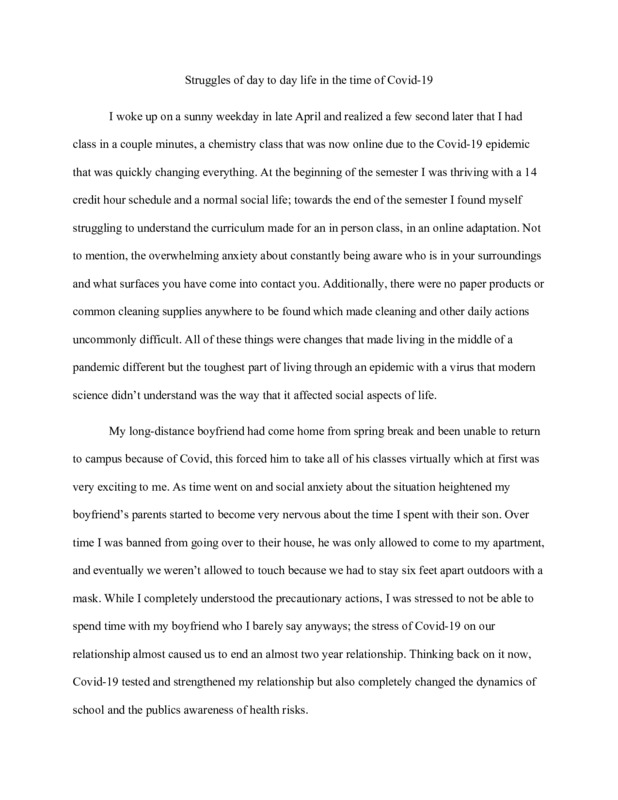 2020-04-27
2020-04-27Life in the Times of Covid-19
This is a description of the way that covid changed little things in my life but also how it affected by academic life and my relationships. This is important to me because the impact that Covid has had in my life has been shocking and eye opening, which is a story that I thought would be worth sharing. -
2020-04-23
Local Bar Experience during COVID
After lockdown, I decided to pay a visit to my local bar, to finally get out of the house. I was expecting a laid back drink, but once I arrived I realized they were not following any protocols. Nobody was wearing masks and tables weren't spread out. The bar quickly filled up, and people did not take the virus seriously at all. Customers were coughing directly into the air towards other patrons. The owner didn't believe COVID existed. My relaxing drink turned into anxiety about possibly catching the disease and spreading it to my father and brother, who both have heart diseases. I haven't been inside a bar or restaurant since that day. -
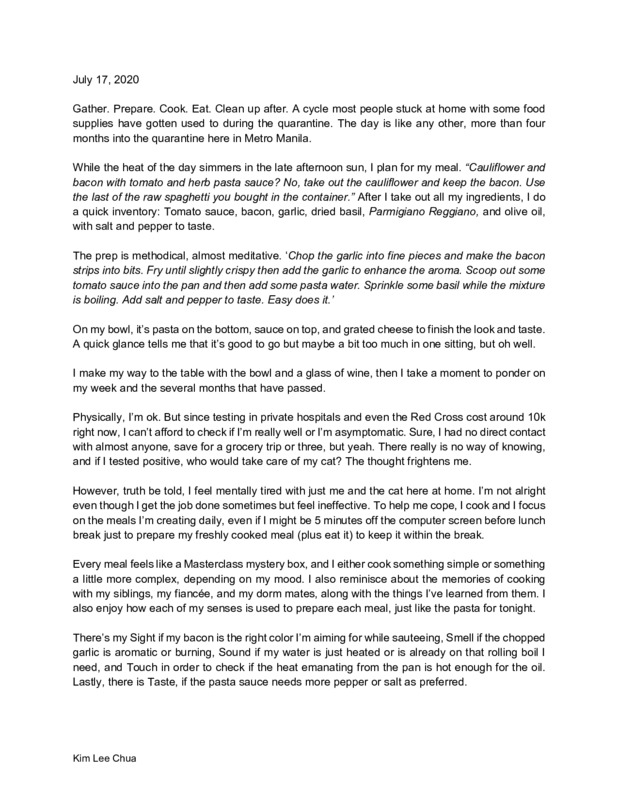 2020-07-17
2020-07-17A Warm Meal Shared
It's my story in how something mundane like cooking a meal and the community of sharing a meal is affected severely by COVID 19. Since I live alone at present, it is difficult, let alone near impossible to share a meal with anyone else and the disconnect I feel affects me and possibly some people who have to live alone and no one to communicate with. It's also a story of longing forward to see my fiancée again and trying to live life with a semblance of normalcy in an uncertain world. -
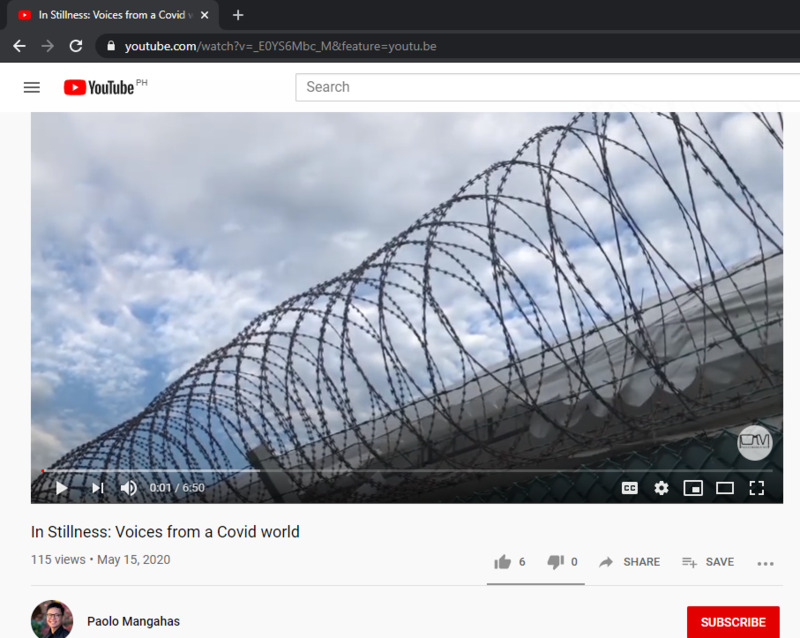 2020-05-16
2020-05-16In Stillness: Voices from a Covid world
"In stillness: Voices from a COVID world" is a short film by writer Paolo Mangahas, which features phone voice recordings of people sharing their thoughts on a locked-down world. This 7-minute video gives an honest glimpse into everyone's struggles, vulnerabilities, and hopes during these challenging times. Paolo currently works and lives in Singapore, where a "circuit breaker" – safety measures to break the chain of COVID-19 transmissions in the community – has been implemented since April 3 (it is expected to be lifted in a phased approach starting June 2). Like the rest of the world, Singapore residents have been asked to stay at home and to only go out for essential activities, which include outdoor exercise. Paolo shot this film entirely using his iPhone during his daily run. -
 2020-05-27
2020-05-27Quarantine Life
Life before the pandemic is almost unrecognizable. Its hard for me to even imagine going back to what life was like before this. It feels like we have been under lockdown/quarantine for a very long time already. -
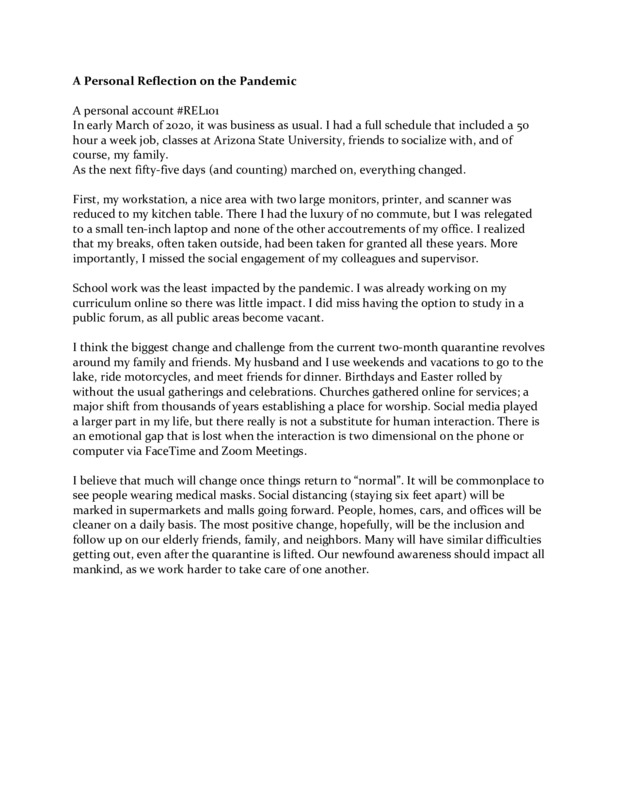 2020-04-28
2020-04-28A Personal Reflection on the Pandemic
In early March of 2020, it was business as usual. I had a full schedule that included a 50 hour a week job, classes at Arizona State University, friends to socialize with, and of course, my family. As the next fifty-five days (and counting) marched on, everything changed. First, my workstation, a nice area with two large monitors, printer, and scanner was reduced to my kitchen table. There I had the luxury of no commute, but I was relegated to a small ten-inch laptop and none of the other accoutrements of my office. I realized that my breaks, often taken outside, had been taken for granted all these years. More importantly, I missed the social engagement of my colleagues and supervisor. School work was the least impacted by the pandemic. I was already working on my curriculum online so there was little impact. I did miss having the option to study in a public forum, as all public areas become vacant. I think the biggest change and challenge from the current two-month quarantine revolves around my family and friends. My husband and I use weekends and vacations to go to the lake, ride motorcycles, and meet friends for dinner. Birthdays and Easter rolled by without the usual gatherings and celebrations. Churches gathered online for services; a major shift from thousands of years establishing a place for worship. Social media played a larger part in my life, but there really is not a substitute for human interaction. There is an emotional gap that is lost when the interaction is two dimensional on the phone or computer via FaceTime and Zoom Meetings. I believe that much will change once things return to “normal”. It will be commonplace to see people wearing medical masks. Social distancing (staying six feet apart) will be marked in supermarkets and malls going forward. People, homes, cars, and offices will be cleaner on a daily basis. The most positive change, hopefully, will be the inclusion and follow up on our elderly friends, family, and neighbors. Many will have similar difficulties getting out, even after the quarantine is lifted. Our newfound awareness should impact all mankind, as we work harder to take care of one another.
